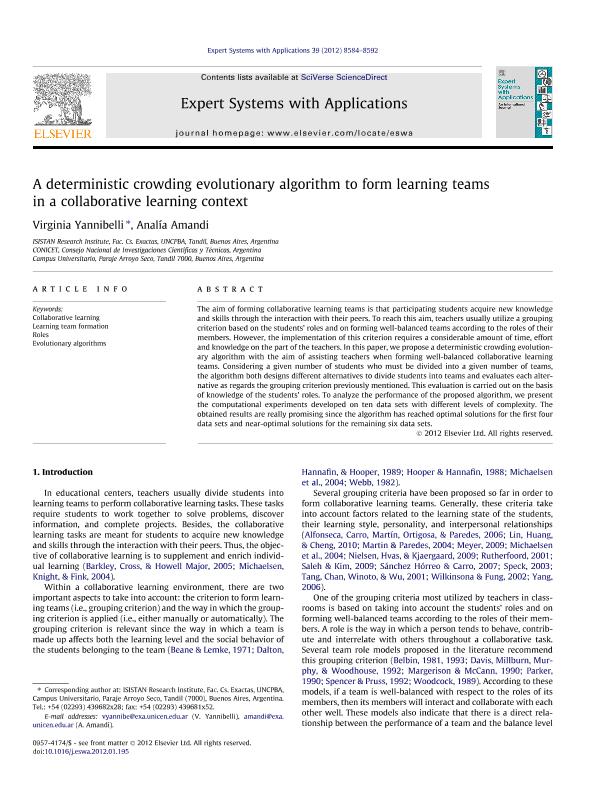Mostrar el registro sencillo del ítem
dc.contributor.author
Yannibelli, Virginia Daniela

dc.contributor.author
Amandi, Analia Adriana

dc.date.available
2020-01-28T19:30:46Z
dc.date.issued
2012-08
dc.identifier.citation
Yannibelli, Virginia Daniela; Amandi, Analia Adriana; A deterministic crowding evolutionary algorithm to form learning teams in a collaborative learning context; Pergamon-Elsevier Science Ltd; Expert Systems with Applications; 39; 10; 8-2012; 8584-8592
dc.identifier.issn
0957-4174
dc.identifier.uri
http://hdl.handle.net/11336/96015
dc.description.abstract
The aim of forming collaborative learning teams is that participating students acquire new knowledge and skills through the interaction with their peers. To reach this aim, teachers usually utilize a grouping criterion based on the students' roles and on forming well-balanced teams according to the roles of their members. However, the implementation of this criterion requires a considerable amount of time, effort and knowledge on the part of the teachers. In this paper, we propose a deterministic crowding evolutionary algorithm with the aim of assisting teachers when forming well-balanced collaborative learning teams. Considering a given number of students who must be divided into a given number of teams, the algorithm both designs different alternatives to divide students into teams and evaluates each alternative as regards the grouping criterion previously mentioned. This evaluation is carried out on the basis of knowledge of the students' roles. To analyze the performance of the proposed algorithm, we present the computational experiments developed on ten data sets with different levels of complexity. The obtained results are really promising since the algorithm has reached optimal solutions for the first four data sets and near-optimal solutions for the remaining six data sets.
dc.format
application/pdf
dc.language.iso
eng
dc.publisher
Pergamon-Elsevier Science Ltd

dc.rights
info:eu-repo/semantics/openAccess
dc.rights.uri
https://creativecommons.org/licenses/by-nc-nd/2.5/ar/
dc.subject
COLLABORATIVE LEARNING
dc.subject
EVOLUTIONARY ALGORITHMS
dc.subject
LEARNING TEAM FORMATION
dc.subject
ROLES
dc.subject.classification
Ciencias de la Computación

dc.subject.classification
Ciencias de la Computación e Información

dc.subject.classification
CIENCIAS NATURALES Y EXACTAS

dc.title
A deterministic crowding evolutionary algorithm to form learning teams in a collaborative learning context
dc.type
info:eu-repo/semantics/article
dc.type
info:ar-repo/semantics/artículo
dc.type
info:eu-repo/semantics/publishedVersion
dc.date.updated
2020-01-22T20:55:44Z
dc.journal.volume
39
dc.journal.number
10
dc.journal.pagination
8584-8592
dc.journal.pais
Estados Unidos

dc.description.fil
Fil: Yannibelli, Virginia Daniela. Consejo Nacional de Investigaciones Científicas y Técnicas. Centro Científico Tecnológico Conicet - Tandil. Instituto Superior de Ingeniería del Software. Universidad Nacional del Centro de la Provincia de Buenos Aires. Instituto Superior de Ingeniería del Software; Argentina
dc.description.fil
Fil: Amandi, Analia Adriana. Consejo Nacional de Investigaciones Científicas y Técnicas. Centro Científico Tecnológico Conicet - Tandil. Instituto Superior de Ingeniería del Software. Universidad Nacional del Centro de la Provincia de Buenos Aires. Instituto Superior de Ingeniería del Software; Argentina
dc.journal.title
Expert Systems with Applications

dc.relation.alternativeid
info:eu-repo/semantics/altIdentifier/doi/http://dx.doi.org/10.1016/j.eswa.2012.01.195
dc.relation.alternativeid
info:eu-repo/semantics/altIdentifier/url/https://www.sciencedirect.com/science/article/pii/S0957417412002230
Archivos asociados
